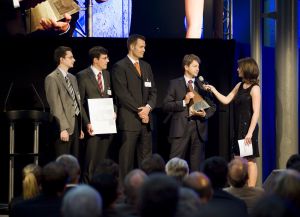With its noise-free and spectrally pure light, the organic laser “Visolas do” among others improves the analysis of samples in medicine. KIT scientists developed this novel laser technology that is now commercialized by Visolas GmbH founded in May. Customers are manufacturers in the field of spectroscopy and scientific and industrial companies with measurement and analysis tasks. For its innovative approach, the spin-off was granted the Special CyberOne High-tech Award of the state of Baden-Württemberg.
“In spectroscopy, that is measurement with light at variable wavelengths, colored light is required for the analysis of samples in medicine, science or industrial practice,” explains Thomas Woggon, Managing Director of Visolas GmbH and scientist of the Light Technology Institute (LTI) of KIT. “With light, scientists can measure very rapidly and discover smallest traces of substances. So far, the light required for analysis was filtered out of a white light source. This light, however, is of limited quality. Hence, lasers play an important role, but the lasers used so far are very large, complex, and difficult to operate and cannot be used in an economically efficient manner.”
VISOLAS has now succeeded in combining the flexibility of dye lasers with a low-cost and compact design. The new organic solid-state lasers use an optical grating as resonator and can be produced in a few process steps only. They generate noise-free and spectrally pure light that considerably enhances the quality of spectroscopic measurements. An additional advantage consists in the fact that the easy-to-operate and compact device can produce any colors in the visible range. The costs of these lasers are far below those of dye laser devices. The company applies an innovative technology based on polymers. The laser chip platform developed can produce the visible wavelengths required for analysis with a small expenditure in a rapid and stepless manner.
VISOLAS GmbH is the result of a close cooperation of the Light Technology Institute (LTI) with the Institute of Microstructure Technology (IMT) of KIT. The team consists of the three founders Peter Greiner, Thomas Woggon, Johannes Barth, and of Stefan Hengsbach. It is supported scientifically by the co-founders Professor Uli Lemmer, Head of LTI, and Dr. Timo Mappes, IMT. Close cooperation between LTI and IMT resulted in the production of a high-performance organic semiconductor laser by replication of micro- and nanometer structures. This laser may be applied as a robust, inexpensive laser light source. “Organic semiconductors are applied in OLEDS already, which are used in displays of mobile phones and to an increasing extent in illumination technology,” says Professor Uli Lemmer. “As processing is inexpensive, use for lasers increases as well.”
Apart from scientific institutes, VISOLAS also addresses equipment manufacturers in the field of spectroscopy and industrial companies with measurement and analysis tasks. “We have conducted extensive research and development and are now commercializing the new laser generation “Visolas do”. We are very satisfied with the result that is a sound basis for further innovation,” says the Managing Director of VISOLAS, Peter Greiner.
The young enterprise intends to offer for the first time organic solid-state lasers in the form of autonomous devices. These devices will make available laser light for analysis technology (spectroscopy), which can be adjusted freely in frequency (color).
Since late 2010, VISOLAS has been funded by the Federal Ministry of Economics and Technology as a technology transfer project under the EXIST research transfer program.
Further information on VISOLAS GmbH is provided by a video at http://www.youtube.com/watch?v=CnmLWQQ-eBs and www.visolas.de.
Being “The University in the Helmholtz Association”, KIT creates and imparts knowledge for the society and the environment. It is the objective to make significant contributions to the global challenges in the fields of energy, mobility, and information. For this, about 10,000 employees cooperate in a broad range of disciplines in natural sciences, engineering sciences, economics, and the humanities and social sciences. KIT prepares its 22,800 students for responsible tasks in society, industry, and science by offering research-based study programs. Innovation efforts at KIT build a bridge between important scientific findings and their application for the benefit of society, economic prosperity, and the preservation of our natural basis of life. KIT is one of the German universities of excellence.

